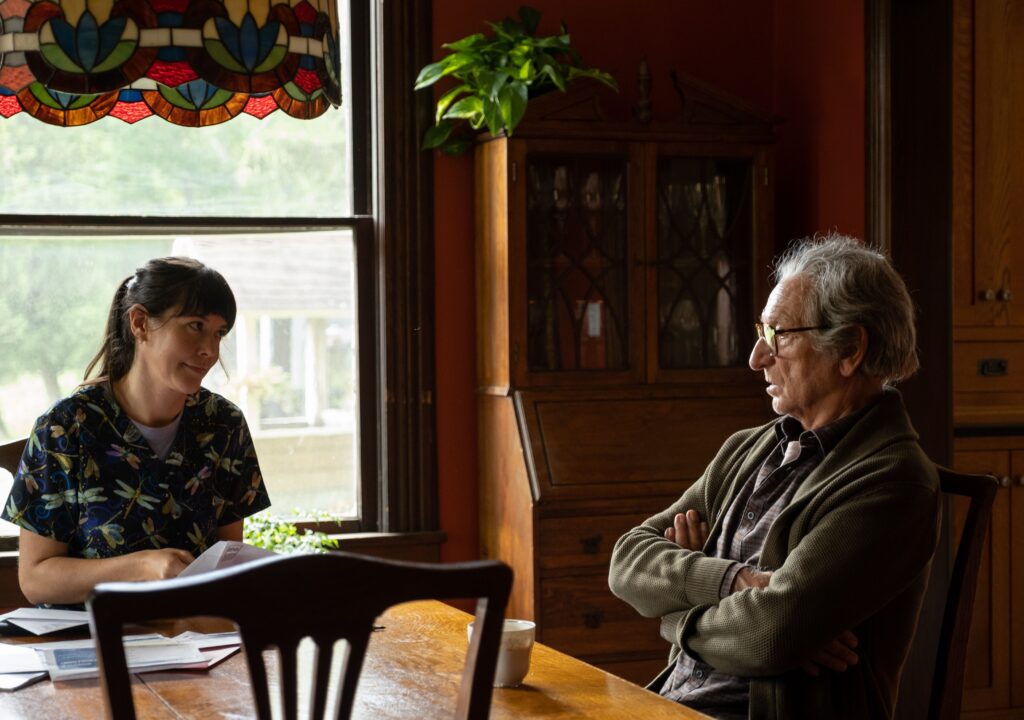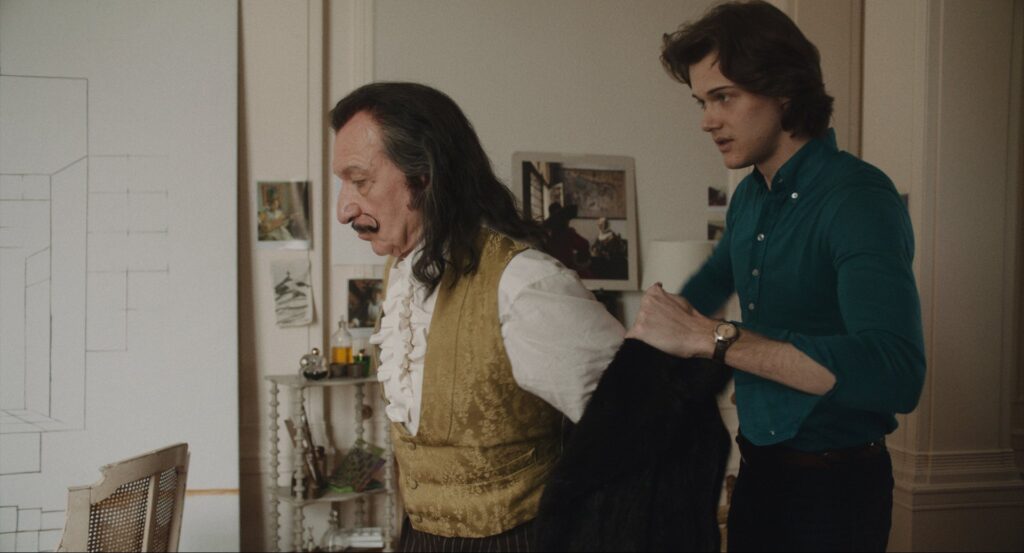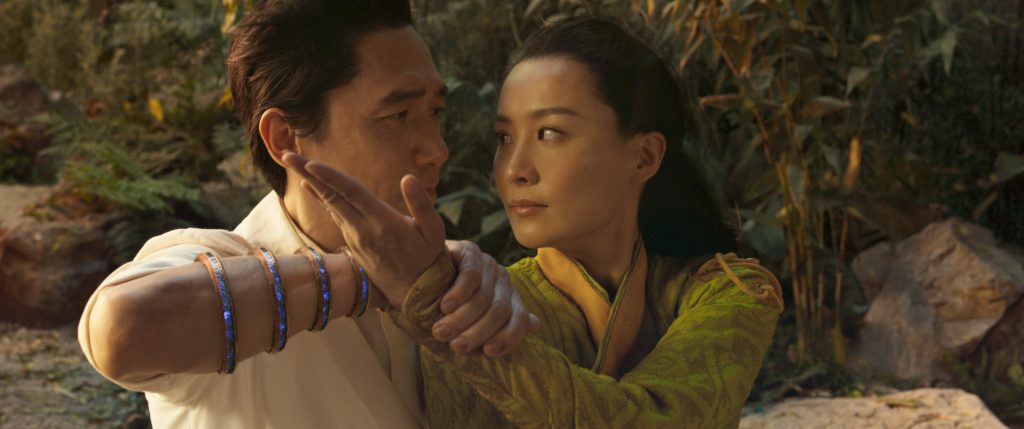September 11, 2023
by Carla Hay

Directed by Marc Turtletaub
Culture Representation: Taking place in an unnamed city n Pennsylvania, the sci-fi comedy/drama film “Jules” has a predominantly white cast of characters (with a few African Americans and Latin people) representing the working-class and middle-class.
Culture Clash: An elderly man with dementia befriends an outer-space alien whose spaceship crashed in his backyard, but most of the people he tells don’t believe him.
Culture Audience: “Jules” will appeal primarily to people who are fans of stars Ben Kingsley and Jane Curtin and movies that being a senior citizen perspective to science-fiction stories.

The ending of “Jules” is entirely predictable, and some of the scenarios are corny. However, this sci-fi comedy/drama about three elderly people who take care of an outer-space alien has some charm and poignant observations about aging and dementia. “Jules” balances out some of its silliness with some gravitas about real-life issues about how society treats elderly disabled people
Directed by Marc Turtletaub and written by Gavin Steckler, “Jules” takes place in an unnamed Pennsylvania city which is supposed to represent a typical American suburb. “Jules” was actually filmed in New Jersey. The central character in the story is not named Jules. His name is Milton Robinson (played by Ben Kingsley), a 78-year-old widower who has early on-set dementia. He hasn’t been to a doctor in three years and stubbornly refuses to go.
Milton lives alone but his daughter Denise Robinson (played Zoë Winters) lives nearby and frequently checks up on him and helps Milton with organizing his bill payments. Milton has a son who lives in California but who doesn’t keep in touch with Milton. Denise is a veterinarian at a local clinic. She worries about Milton’s deteriorating health, but Milton insists that he is capable of living by himself and doesn’t need a medical checkup.
As an example of Milton’s dementia, Denise finds a can of beans in his bathroom medicine cabinet. Milton brushes off this misplacement as no big deal. “I must’ve been confused,” he says nonchalantly.
The closest thing that Milton has to a social life is attending city council meetings, where his stands up to make nitpicky comments. For example, at a meeting shown in the begnning of the movie, Milton says that the town slogan should be changed from “A great place to call home” to “A great place to refer to as home,” because he thinks the word “call” could be misintepreted as a phone call. He also suggests that there should be a crosswalk in a certain intersection.
Clearly, Milton has too much time on his hands. But so do some other elderly residents of the city who regularly go to city council meetings. Two of these regulars are sweet-natured Sandy (played by Harret Sansom Harris) and prickly Joyce (played by Jane Curtin), who both live alone. Sandy seems to be attracted to Milton, but he doesn’t pick up on her social cues that she wants to get to know him better.
One night, at 12:52 a.m., Milton hears the sound of something large landing in his backyard. The noise wakes up Milton, who goes in backyard and sees that a spaceship that’s about 20 feet wide has crashed into his flower bed. Milton is dismayed that this ship has “crashed into my azaleas.” Milton calls 911 and reports what happened, but the operator thinks it’s a prank call.
The next day happens to be a city council meeting, so Milton announces that a spaceship is in his backyard. No one believes him there either. After the meeting, Joyce scolds Milton for talking about a spaceship in his backyard, because she thinks it will make the city council not take senior citizen seriously.
When Milton goes home, he is shocked to see a space alien collapsed on his back patio. The alien is about 5’4″ and looks like a human in every way, except that it has ghostly white skin and a stereotypical “space alien” face. Milton invites the alien into the house and gives it some food. The news has reported that a satellite was seen crashing somewhere in western Pennsylvania.
Sandy comes over to Milton’s house to ask to use his computer printer when she sees the alien. She advises that Milton keep the alien a secret and suggest that they call the alien Jules. (The assume that the alien is male.) Jules tries to fix his spaceship to no avail. Eventually, Joyce finds out about the alien too and agrees to keep it a secret. None of this is spoiler information, since it’s already revealed in the movie’s trailer that Milton, Sandy and Joyce spend time with Jules.
The rest of the movie shows what happens Jules (who stays at Milton’s place), Joyce and Sandy befriend Jules, who does not talk in any human language but seems to understand what humans are saying. Will other people find out about Jules? And will Jules get the spaceship working again to go back home? Those questions are answered in the movie.
“Jules” has sentimental moments as well as some off-the-wall, unpredictable moments that show this movie isn’t as lightweight “cute” as it might first appear to be. (Hint: There’s something that involves cats that is definitely on the bizarre side of the spectrum.) The movie also has compassionate depictions of elderly loneliness and the challenges of having dementia.
Kingsley gives a nuanced performance as Milton, who knows that his mental health is getting worse but he is defiantly trying to hold on to his dignity. With Jules, he finds a companion who is non-judgmental and is experiencing a different type of loneliness by being on a foreign planet. Curtin and Harris also capably handle their roles as Joyce and Sandy, with Curtin having the most comedic moments in the movie.
Don’t expect there to be any heavy messages in “Jules” about why this alien has arrived on Earth. Viewers also will not learn much about the planet where Jules lives. The main takeaway from the movie is how this alien affects the lives and the people who take the time to help Jules and learn things about themselves along the way.
Bleecker Street released “Jules” in U.S. cinemas on August 11, 2023. The movie will be released on digital and VOD on September 12, 2023, and on Blu-ray and DVD on October 10, 2023.




